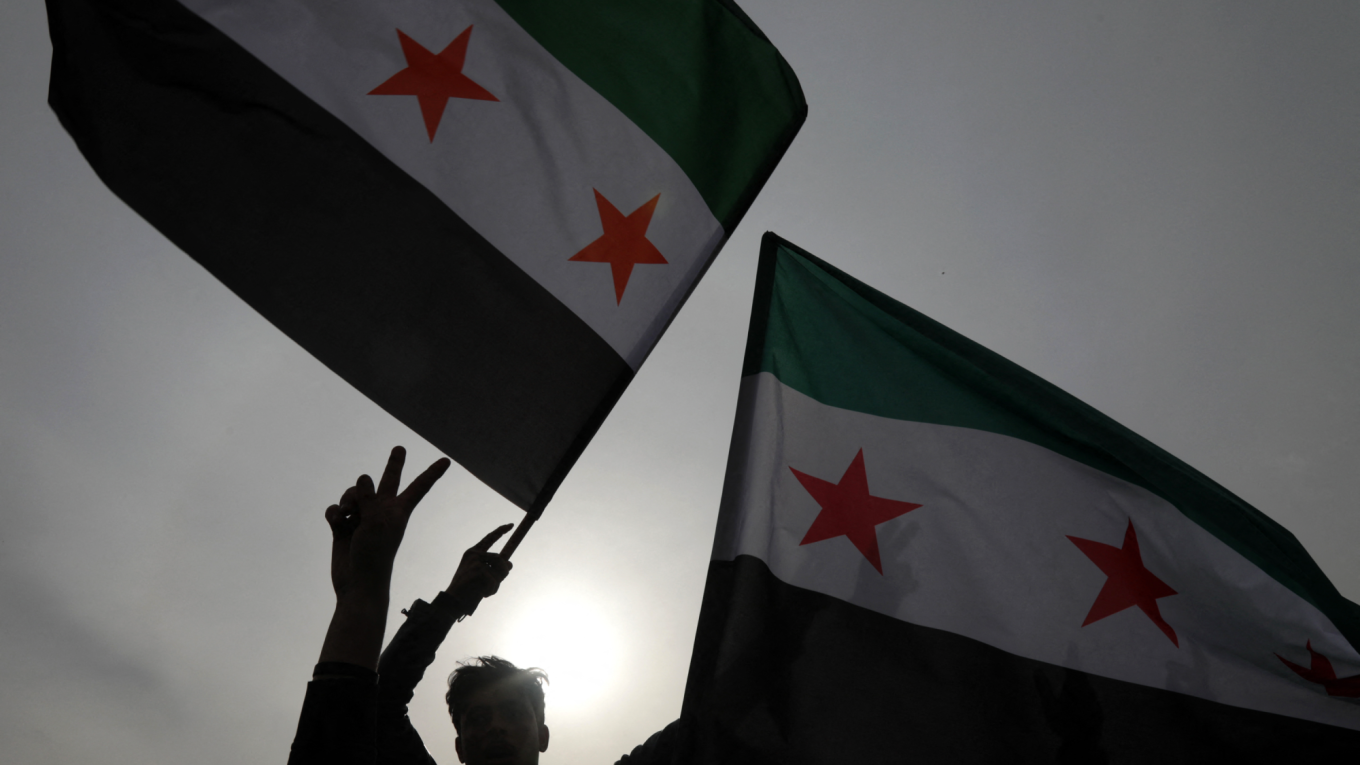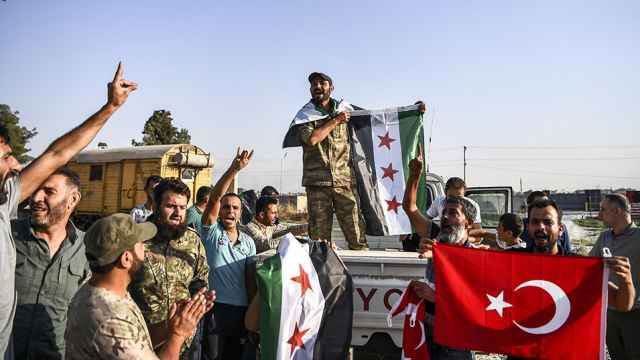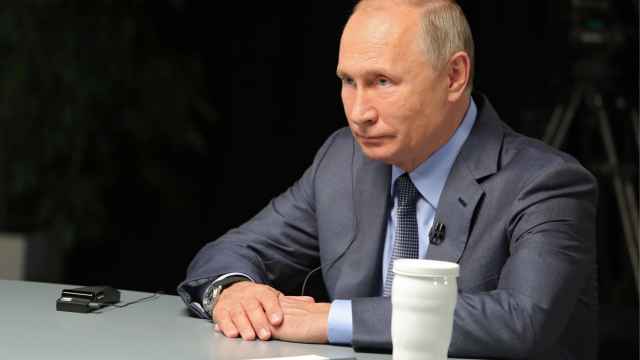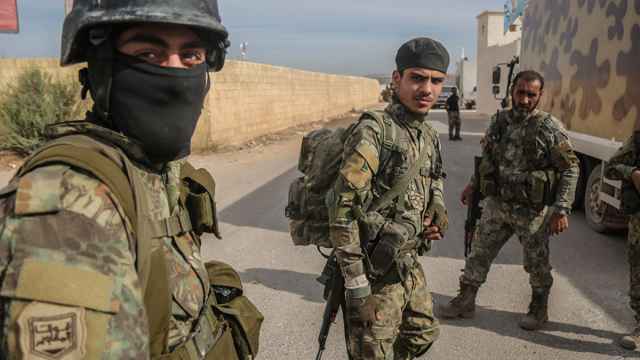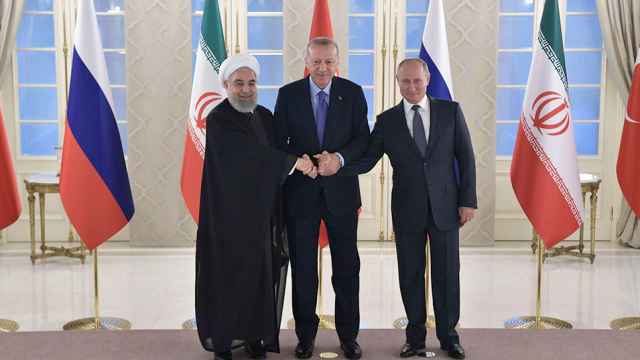Seven years ago, President Vladimir Putin traveled to Syria to meet with his ally, then-Syrian leader Bashar al-Assad, at Russia's Khmeimim air base in Latakia.
In a triumphant speech, Putin declared victory over Assad's enemies once and for all.
“If the terrorists raise their heads again,” he said of the Syrian opposition and the Islamic State terrorist group, “we will deal unprecedented strikes unlike anything they have seen.”
Fast forward from 2017 to 2024, and Russia, bogged down in its war against Ukraine, has watched the Syrian regime fold to a lightning two-week insurgent offensive.
As Syria navigates its uncertain future, Assad's downfall carries considerable political, military and economic costs for Russia, which has long used Syria as a foothold for its influence in the Middle East.
Political losses
Since intervening in the Syrian Civil War in 2015, Russia has positioned itself as a key power broker in the Middle East.
Moscow stepped in on Assad’s behalf after the mass protests of 2011 spiraled into civil war and jeopardized his hold on power. Over the years, Russia's backing helped Assad regain much of the territory he had lost to opposition forces and the Islamic State, cementing Moscow's role as a dominant player in the region.
The swift collapse of Assad's regime in 2024 has upended that narrative.
While Putin has yet to comment on Assad’s overthrow, his spokesman Dmitry Peskov admitted on Monday that Moscow was taken by surprise.
"What happened has surprised the whole world and, in this case, we are no exception," Peskov said.
The U.S.-based Institute for the Study of War described Russia’s inaction as the sign of a "strategic political defeat for Moscow."
“Russia's inability or decision to not reinforce Assad's regime” during the insurgents’ rapid offensive across Syria will “also hurt Russia's credibility as a reliable and effective security partner throughout the world, which will in turn negatively affect Putin's ability to garner support … for his desired multipolar world,” the ISW said.
Nikita Smagin, an expert on Russian foreign policy in the Middle East, said Moscow's inability to save Assad should be viewed through a longer-term lens.
"If you don't win a civil war with a quick blitzkrieg, you are likely to get bogged down in a protracted conflict, and sooner or later this will lead to defeat," Smagin told The Moscow Times, explaining the situation Assad found himself in.
With Assad now seeking refuge in Moscow, the Kremlin has yet to decide what exactly to do with the forces now in power in Syria, led by the Islamist alliance Hayat Tahrir al-Sham (HTS) and the Turkish-backed Syrian National Army umbrella group. For years, Russia has been on the opposite side of this power struggle and declared HTS a terrorist group.
Yet the Kremlin appears willing to pursue a “normalization” with HTS to maintain its military presence in Syria, Smagin said.
The rhetoric of state-run Russian media has already started to shift, with insurgents now referred to not as “terrorists,” but as the "armed opposition that has taken power in Syria,” Smagin noted, adding that the Syrian Embassy in Moscow also raised the opposition flag.
“For the past nine years, Russia has been bombing these groups — the real question is whether they are ready to work with Russia in the long term,” Smagin said.
Tatiana Stanovaya, a senior fellow at the Carnegie Russia Eurasia Center, shared a similar view.
“The key question now is how Moscow will adapt to the new reality and how much flexibility it will have in engaging with the new rulers of Syria,” Stanovaya said. “If the moment is missed, it will be more logical to speak of a defeat.”
Military losses
Syria has also been pivotal for Russia's military strategy in the Middle East, hosting two strategically important sites on Syria's Mediterranean coast: the Hmeimim air base and the Tartus naval base, which plays a key role in supporting Russia's maritime operations in the region.
Following Assad's ousting, Russia appears to be preparing to withdraw its military assets from Syria, ISW said.
Russian troops also reportedly requested Ankara’s support for their safe exit from Syria, CNN Turk said Sunday.
Peskov said Monday that while it was premature to discuss the future of Russia’s military presence in Syria, negotiations were underway with the new authorities in Damascus to ensure the safety of Russian personnel and assets.
Experts suggest that Russia’s loss of its bases in Syria will likely significantly reduce its influence in the Middle East and disrupt its military logistics in Africa.
Marat Gabidullin, a former Wagner mercenary who fought in Syria, told The Moscow Times that Syria served as a key hub for transporting Russian fighters to Africa. Any disruption to this logistics network, therefore, would significantly complicate Russia’s position on the African continent.
“Losing the bases would certainly be undesirable [for the Kremlin] in that sense,” Smagin said. “There's also the issue of prestige, which Russia often emphasizes.”
While Russia’s intervention in Syria was aimed at restoring its status as a great power, maintaining a military presence there is important for both strategic reasons and to preserve prestige and authority, Smagin said.
Economic losses
Russia's economic losses have been relatively modest and fall into three broad categories.
The first has to do with the direct cost of military support for the Assad regime since the start of Russia’s intervention.
In 2015-16, when the Syrian conflict was at its height, analysts estimated the cost of the Russian campaign at around $1.5 billion to $3 billion per year.
According to an analysis by the U.K.-based IHS Jane think tank commissioned by The Moscow Times in 2015, the cost of maintaining Russia's military presence in Syria could range from $2.4 million to $4 million per day, or between $880 million and $1.46 billion a year.
These costs included the operation of warplanes, helicopters and military personnel.
Bloomberg, citing sources, claimed that Moscow had earmarked $1.2 billion for the cost of the Syrian operation for the whole of 2016.
The outlet also cited a Royal United Security Institute think tank’s estimate that Russia's actual spending on its Syrian campaign at closer to $3 billion a year, as Moscow decided to deploy more troops into the country.
The second category of Russian spending on Syria is the amount of financial support Moscow may have provided to Assad's regime.
Russia does not publish data on its borrowers and their debt, but some estimates can be made from alternative sources.
According to World Bank estimates, Syria owed Russia $525 million as of 2022.
Finally, Russia’s losses include the business investments that the Russian state and companies may abandon after the fall of Assad.
Unlike some of its neighbors, Syria is not particularly rich in fossil fuels. It accounts for only 0.3% of the Middle East's proven oil reserves (2.5 billion barrels) and 0.4% of proven natural gas reserves (0.3 trillion cubic meters), analyst Kirill Rodionov noted.
Instead, Moscow has moved to invest in Syria's mineral industry, which was thriving before the civil war, and in its infrastructure.
Most notably, in 2019 Russia said it would invest $500 million in the Syrian port of Tartus, where Russia established a naval base. It is not clear how much of this sum Moscow actually spent in the run-up to the Assad regime’s collapse.
In addition, structures linked to Kremlin-connected businessman Gennady Timchenko were allegedly granted access to a Syrian phosphate mine near the city of Palmyra. Syria is estimated to have substantial reserves of phosphates, which are used in the production of various goods, especially fertilizers.
However, according to a 2019 Financial Times report, the Syrian regime and Russia sold phosphate to the global market from existing stockpiles and did not invest their own resources into new mining.
Indeed, despite lofty announcements of major projects, Russia has not publicly confirmed any substantial investments already made in Syria.
In total, according to the most generous estimates, Russia’s unsuccessful backing of Assad may have cost it about $27.5 billion over nine years.
A Message from The Moscow Times:
Dear readers,
We are facing unprecedented challenges. Russia's Prosecutor General's Office has designated The Moscow Times as an "undesirable" organization, criminalizing our work and putting our staff at risk of prosecution. This follows our earlier unjust labeling as a "foreign agent."
These actions are direct attempts to silence independent journalism in Russia. The authorities claim our work "discredits the decisions of the Russian leadership." We see things differently: we strive to provide accurate, unbiased reporting on Russia.
We, the journalists of The Moscow Times, refuse to be silenced. But to continue our work, we need your help.
Your support, no matter how small, makes a world of difference. If you can, please support us monthly starting from just $2. It's quick to set up, and every contribution makes a significant impact.
By supporting The Moscow Times, you're defending open, independent journalism in the face of repression. Thank you for standing with us.
Remind me later.



